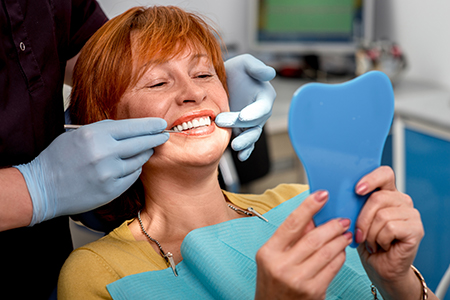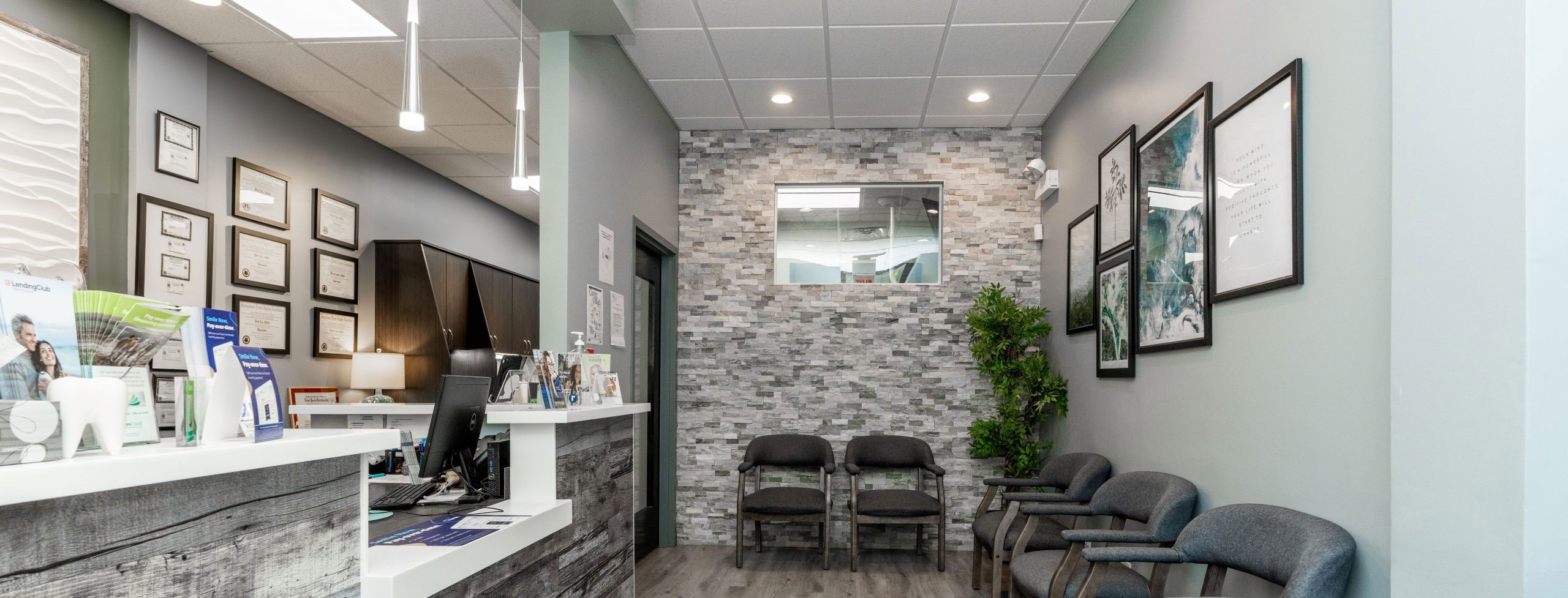New Patients
Existing Patients
New Patients
Existing Patients
New Patients
Existing Patients
New Patients
Existing Patients
New Patients
Existing Patients
New Patients
Existing Patients
New Patients
Existing Patients
New Patients
Existing Patients
Advances in dental materials and clinical techniques have given modern dentures a level of comfort, fit, and appearance that would have been hard to imagine a generation ago. While dental implants and fixed bridgework offer excellent fixed options for many people, removable dentures remain a reliable and versatile solution when rebuilding a smile is the priority.
Our team custom-designs each prosthesis to reflect facial contours, restore oral function, and help patients feel confident when they speak and eat. With careful planning and attention to detail, a well-made denture can be a durable, natural-looking component of a healthy mouth.
At Artistic Family Dental, we focus on personalized care: evaluating your oral health, discussing realistic goals, and recommending the denture style that best fits your needs and daily life. Below, you’ll find an in-depth look at how dentures work, the options available, and what to expect from the process.
Losing teeth changes more than the look of your smile. Missing teeth alter the way your jaw and facial tissues support one another, can change how your bite functions, and often affect speech clarity and nutritional choices. Over time, these changes may lead to drifting of adjacent teeth and gradual changes in facial support that can make the lower face appear shorter or collapsed.
When chewing is compromised, people commonly avoid certain foods, which can reduce dietary variety and affect overall nutrition. Difficulty speaking clearly can impact social and professional interactions. Addressing tooth loss with a prosthetic solution helps restore essential functions and preserves the remaining teeth and tissues from additional wear or movement.
Replacing teeth in a timely manner also helps maintain the alignment and health of any remaining dentition. A thoughtfully designed denture not only fills gaps but also supports soft tissues and facial contours, reducing the visible effects that can otherwise develop as a result of long-term tooth loss.

Dentures are removable prosthetic devices made to replace missing teeth and the surrounding gum tissue. They combine artificial teeth set into a base that conforms to the shape of the gums and jaw. The base is typically crafted to mimic natural gum color and contours, creating a balanced, lifelike appearance.
Unlike permanent restorations such as bridges or implants, removable dentures are designed to be taken out for cleaning and overnight rest. This removability makes it easier to maintain the health of the gums and any existing teeth, while also allowing for periodic adjustments as the mouth naturally changes.
Today’s denture materials and fabrication methods allow for improved comfort and stability. From resilient acrylics and precision attachments to implant-retained options, there are ways to enhance fit and reduce common concerns such as slippage or sore spots. A careful impression, accurate bite records, and fine-tuned laboratory work are essential steps in achieving predictable results.
Choosing the right denture begins with a detailed clinical exam. We assess the condition of any remaining teeth, the shape of the jaws, tissue health, and how you use your mouth every day. That information guides whether a partial denture, a full denture, or an implant-supported solution is most appropriate.
Partial dentures replace several missing teeth while working around healthy natural teeth; they often use clasps or precision attachments for retention. Full (complete) dentures restore an entire arch when all teeth in the upper or lower jaw are missing. Each approach has variations tailored to patient needs and anatomic limitations.
Communication about lifestyle and expectations also plays a role. Some patients prefer a simpler removable option that is straightforward to maintain, while others seek the added security of implant attachments. Our objective is to match the prosthesis to both clinical realities and everyday preferences so the result is functional and comfortable.
Complete dentures replace all teeth in an arch and are carefully shaped to fit the unique contours of the gums and palate. The success of a complete denture depends on accurate impressions, the way the bite is established, and how well the prosthesis distributes chewing forces across the tissues.
In the conventional approach, teeth are removed and the tissues are allowed to heal before the final denture is made and placed. Healing time helps ensure a stable intimate fit between the denture base and the gum tissues, which often translates to better comfort and function.
Immediate dentures
Immediate dentures are inserted at the same appointment as extractions so the patient does not go without teeth during healing. While they provide immediate esthetic benefits, these dentures typically require follow-up adjustments and relines to accommodate soft-tissue changes as healing progresses.
Overdentures
An overdenture gains additional support from remaining natural tooth roots or specially placed attachments. Preserving strategic teeth or roots can improve preservation of jawbone volume and offer more predictable stability than traditional complete dentures alone.
Implant-supported dentures
Implant-supported dentures use a number of dental implants as anchors for the prosthesis. These attachments dramatically increase retention and reduce movement during eating and talking, creating a secure feel that many patients prefer for long-term function.
Partial dentures bridge gaps left by one or more missing teeth and help hold neighboring teeth in their proper positions. They can be crafted with cast metal frameworks, flexible resin bases, or hybrid materials depending on comfort, esthetics, and functional demands.
Well-designed partials preserve chewing efficiency, reduce stress on remaining teeth, and can be upgraded or modified if the mouth changes. When planned as part of a comprehensive restorative strategy, a partial denture can be a conservative and practical option for many patients.
Patient-specific considerations—such as the health of adjacent teeth, periodontal stability, and bite relationships—inform the final design. The goal is to produce a prosthesis that restores appearance and function while being easy to wear and care for.
Our clinical team bases every recommendation on a careful examination and a clear discussion of goals so you know what to expect from treatment and how to care for your new denture every day.

Producing a denture that looks natural and functions well requires coordination among examination, imaging, laboratory work, and clinical adjustments. We begin with a comprehensive review of your medical and dental history, along with diagnostic images when needed, to develop a step-by-step plan tailored to your situation.
Preparatory work may include simple restorative care, periodontal treatment, or extractions so the mouth is healthy and ready for a prosthesis. In some cases, minor surgical procedures to reshape or smooth the ridge can improve the final fit and long-term comfort of the denture.
Precision impressions, trial fittings, and careful selection of tooth shape and shade are all part of the process. Your input during try-in appointments helps us achieve a result that both looks natural and feels right. After insertion, a few adjustment visits are normal as the tissues adapt and we refine the bite.
Where implant attachments are used, additional surgical and healing phases will be included in the timetable. The practice coordinates these steps so patients receive clear guidance and predictable care from start to finish.

Adjusting to a new denture is a process. In the first weeks, you may notice increased saliva, minor speech changes, or areas that need pressure relief. These reactions are common and usually settle with time and minor adjustments from your provider.
Getting comfortable with speech and chewing
Practice helps: reading aloud and starting with softer foods will build confidence. Chew slowly and use both sides of the mouth to distribute forces evenly. As you gain experience, your chewing efficiency and clarity of speech should return to a natural level.
Hygiene and nightly care
Cleaning dentures daily and removing them at night protects the underlying tissues and prevents plaque accumulation. Rinse after meals, brush the prosthesis with a suitable brush and cleaner, and soak dentures overnight when recommended by your clinician.
Recognizing when adjustments or relines are needed
Over time, the contours of the jaw and gums change. If a denture begins to feel loose, causes sore spots, or affects chewing, a reline or adjustment can restore fit and comfort. Routine recall visits also allow us to monitor oral health and the condition of the prosthesis.
Enhancing stability
For patients who need additional retention, options such as denture adhesives, precision attachments, or implant-supported designs can significantly increase stability and confidence during day-to-day activities.
Our team is committed to long-term follow-up and patient education so your denture works for you for many years. If you have questions about care, adjustments, or whether an implant-retained approach might better meet your needs, please reach out to our practice for a consultation.
Artistic Family Dental is dedicated to delivering thoughtfully designed denture care that supports your oral health and quality of life. Contact us to learn more about how we can help restore your smile and improve everyday function.

Today, it’s easier than ever to replace missing teeth and achieve natural-looking, durable, and long-lasting results! Depending on a patient’s dental needs, lifestyle, expectations of care, and budget, choices can include conventional fixed bridgework, dental implants, or removable partial and complete dentures. At the office of Artistic Family Dental, we’ll discuss all your options in care and answer all your questions as you choose the solution that’s right for you.
With advances in dental materials and technology, today’s dentures are more comfortable and realistic-looking than ever before.
Whether you wear partial or complete dentures, it’s essential to see the dentist for routine care. Besides checking the fit and condition of your dentures and making any necessary adjustments, you’ll also receive a comprehensive exam to check on the health of any remaining teeth as well as the soft and hard tissues in and around the oral cavity.
A same-day denture offers an accelerated design and fabrication process that allows a patient to go from impression taking to denture insertion in a single day.
For patients who don’t want to wait after having teeth extracted, an immediate denture can be inserted the same day your teeth are removed. Sometime later you may need the denture relined to address any changes in its fit once the extraction sites have completely healed.
While no one wants to drop or break a partial or complete denture, accidents do happen. The good news is that in some cases, your partial or complete denture is reparable. It all depends on the extent of the damage. Don’t hesitate to contact our office if you’ve broken or damaged your denture. We’re happy to help.
The simple act of taking your partial denture in and out can cause certain types of metal clasps to loosen over time. When you come in for your checkup visit or contact our office for an adjustment, we’ll assess the fit of your partial and tighten the clasps for improved stability and comfort.
While rebuilding a complete smile is a worthwhile investment, our office is sensitive to the costs involved in dental care. We customize care and will discuss which treatment options address your needs, lifestyle, and budget. How much a new denture will cost depends on the type of the prosthesis, its design, and the materials used to fabricate the supportive base, teeth, and clasps or precision attachments. Dentures that include the placement of dental implants for added retention and stability typically involve additional costs.
If you have dental insurance, your coverage may include a new or replacement set of dentures. Our staff is happy to review your coverage with you to ensure you are maximizing your insurance benefits while minimizing any out of pocket expenses.
At the office of Artistic Family Dental, we provide an extensive range of dental services, including the latest and most effective methods to help patients with missing teeth rebuild complete and beautiful smiles. As skilled and experienced professionals, we recognize that every patient is different, and every smile is unique. We’re passionate about what we do and take great pride in providing personalized treatment plans while treating our patients as valued partners in care.
Dentures are removable prosthetic devices created to replace missing teeth and adjacent gum tissue. They combine artificial teeth set into a customized base that conforms to the contours of the gums and jaw to restore appearance and basic oral function. By restoring tooth surfaces and supporting soft tissues, dentures help distribute chewing forces and maintain facial structure.
Their removability makes daily cleaning straightforward and allows the oral tissues to rest overnight, which supports gum health. Proper impressions, bite records, and laboratory fabrication are essential to achieve an accurate fit. Ongoing adjustments help maintain comfort as the mouth changes over time.
Modern dentures benefit from advanced materials and more precise fabrication techniques, which improve comfort, fit, and esthetics compared with older prostheses. Contemporary acrylics, improved tooth materials, and better color-matching create a more natural appearance and more resilient bases. Digital workflows and improved laboratory standards also enhance the predictability of the final result.
In addition, options such as precision attachments and implant retention can address common concerns like slippage and sore spots. Clinicians now place greater emphasis on individualized design to match facial contours and chewing patterns. These advances make dentures a more reliable long-term solution for many patients.
The main categories are complete (full) dentures, removable partial dentures, overdentures that use remaining roots for support, and implant-supported options that anchor the prosthesis to dental implants. Complete dentures restore an entire arch when all teeth are missing, while partials replace several teeth and work around healthy teeth for retention. Each type has variations in design to address individual anatomy and lifestyle needs.
Choosing the appropriate denture begins with a clinical exam that considers the condition of remaining teeth, jaw shape, tissue health, and how you use your mouth daily. Discussion of patient preferences—such as ease of maintenance versus added stability from implants—also guides the recommendation. Your clinician will explain which option best balances comfort, function, and long-term oral health.
The process starts with a comprehensive evaluation of medical and dental history, a clinical exam, and diagnostic imaging when necessary to develop a tailored treatment plan. Preparatory steps may include restorative work, periodontal treatment, or extractions to ensure a healthy foundation for the prosthesis. Impressions, bite records, and trial fittings follow to refine tooth position, shade, and occlusion.
Final insertion includes careful adjustments to ensure comfort and proper function, and a few follow-up visits are common as tissues adapt. For implant-retained solutions, additional surgical and healing phases will be scheduled and coordinated with prosthetic stages. Our team at Artistic Family Dental works to communicate each step so patients understand the timeline and expected outcomes.
Implant-supported dentures use dental implants as anchors for the prosthesis, providing greater retention and stability compared with conventional removable dentures. This anchorage reduces movement during eating and speaking and often enhances chewing efficiency and patient confidence. Implant attachments can be used with full arches or to support overdentures that preserve remaining roots or tooth structure.
Because implants are anchored in the jawbone, they also help preserve bone volume and facial support over time, which can reduce the degree of ridge resorption compared with unsupported dentures. The treatment involves surgical placement and a healing interval before final prosthetic attachment, and it is planned according to health, anatomy, and functional goals. Your clinician will review candidacy considerations and expected phases of care.
Adapting to new dentures typically involves an initial period of increased saliva, minor speech changes, and areas of pressure that require adaptation or adjustment. These reactions are common and usually subside as your muscles and tissues adapt to the prosthesis. Practicing speaking aloud and beginning with softer foods will help rebuild chewing skills and improve clarity of speech.
Follow-up visits are an important part of the adjustment phase so clinicians can relieve sore spots, refine the bite, and make small changes that improve function. Patients should report persistent pain, significant looseness, or ongoing difficulty eating so the prosthesis can be evaluated. With proper care and timely adjustments, most people achieve comfortable daily function.
Daily cleaning includes rinsing dentures after meals, brushing the prosthesis with a suitable denture brush and cleaner, and soaking them overnight when recommended by your clinician. Removing and cleaning dentures at night helps protect the underlying tissues and prevents plaque accumulation. Avoid using abrasive cleaners or hot water that can warp acrylic bases.
Maintain oral hygiene for any remaining natural teeth and soft tissues by brushing and using appropriate interdental care, and keep regular dental checkups to monitor fit and tissue health. If a denture becomes damaged or shows signs of wear, have it evaluated by your dental provider rather than attempting at-home repairs. Routine professional care prolongs function and comfort.
Changes in jawbone and gum contours over time can cause a denture to feel loose or develop sore spots, indicating the need for a reline or adjustment. Relining reshapes the interior surface of the denture to better match current tissue contours, restoring close fit and comfort. Adjustments correct pressure areas or occlusion issues that develop after insertion and are common during the adaptation phase.
Replacement becomes necessary when a denture shows significant wear, fracture, or when anatomical changes make relines impractical for restoring function. Regular recall appointments allow clinicians to monitor oral changes and recommend the appropriate maintenance or replacement schedule for long-term oral health. Prompt attention to fit problems helps prevent tissue irritation and functional decline.
Yes, dentures can initially alter speech patterns and chewing efficiency, and some patients modify their diet during the adjustment period to accommodate new chewing mechanics. These effects typically improve with practice, gradual reintroduction of a wider range of foods, and proper prosthetic fit. Techniques such as reading aloud, speaking slowly, and chewing on both sides of the mouth help retrain muscles and improve clarity of speech.
When chewing is compromised, clinicians can evaluate denture occlusion, tooth arrangement, and base stability to identify improvements that support better function. In some cases, enhanced retention through precision attachments or implant support may be recommended to restore greater chewing confidence. Working with your dental team ensures nutritional concerns are addressed while your function is restored.
A thorough evaluation with diagnostic imaging and a clinical exam allows the team to assess oral health, remaining dentition, jaw anatomy, and lifestyle goals to determine whether dentures are the appropriate restorative choice. The discussion includes the differences between partial and complete dentures, overdentures, and implant-retained options so you can weigh functional and esthetic outcomes. Treatment planning emphasizes predictable results and long-term oral health.
At Artistic Family Dental, clinicians collaborate with patients to set realistic goals and outline the steps involved in denture care, including follow-up and maintenance. If implants or additional procedures are advisable, the team explains the phases and coordinates care to produce a stable, comfortable prosthesis. A consultation provides personalized recommendations and a clear plan tailored to your needs.

Ready to schedule your next appointment or learn more about our services?
Our friendly team is here to make it easy. Whether you’d like to call, email, or use our convenient online form, we’ll help you find the right time and answer any questions you have. Don’t wait to take the next step toward a healthier, more confident smile—contact Artistic Family Dental today and experience the difference genuine, personalized care can make.